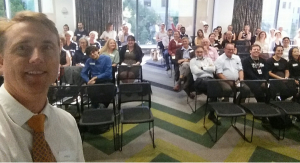(not my niece but from https://pixabay.com/en/baby-boy-crawling-child-infant-390541/)
Over the last week I have been visiting my brother and his wife and their 9 month old baby, Ruby. As I watched Ruby live and learn about the world through experimenting with lots of trials and errors, I thought of the students in my classes expected by the system to learn in a linear and orderly fashion. It’s just not how it’s done.
Ruby started to crawl not long before my visit. While I was there, she couldn’t decide whether it was worth her while to lift from the commando style crawl to the more rigid hands and knees crawl. She was partly deterred from using her knees because as soon as she left her alphabet play-mat she would encounter the hard and slippery wooden floors. But tonight a video was posted online of her crawling, hands and knees, down the length of the hallway, slippery wooden floor and all. The way she placed her hands so deliberately it looked like she’d studied a textbook, or I really should say, YouTube, or that she had been coached. It’s like my daughter after 8 years of tennis coaching running to the net with her coach’s voice in her head telling her how to exactly move her feet and swing the racket. On the other hand, my son, with minimal coaching, runs around on a tennis court like a cartoon Tasmanian devil and has a similar success rate. Yet Ruby wasn’t coached as to how to crawl, by a textbook, video or human. It is part of her natural development, even if some babies skip the hands and knees stage (like her father), and she will become more fluid with practice. How much do we stifle our students’ natural development?
Ruby is normally contained to an area defined by two couches and two walls with just a small gap between a couch and a wall. Sometimes that space is plugged by an ottoman but when it isn’t present off she goes! However, she doesn’t go far because soon she is distracted by a well stocked wine rack. “No”, her mother says. She stops, hesitates, but decides the bottles just look so good she has to touch them. Down swoops Mum to prevent glass shattering, wine loss and a bleeding baby as a result. I’ve always been an advocate for having a few things in the house which babies and toddlers can touch but shouldn’t, to start early the idea of self regulation. I’m not so sure now. How much do we harm our students by forcing them to be contained within classrooms, subjects and timetables?
Our children need freedom to discover and learn, to try and fail and fail again. Ruby tried to pull out a bottle of wine several times in the 5 days I was there but she was thwarted on every occasion, as is necessary for her safety. But still she persisted. When do children lose persistence? I suspect it is when they discover adults have all the answers. Or Google. They can then become passive in their learning. I remember when I was little asking my Mum what certain words meant or how they were spelt and being told to look it up in the dictionary. Now I just type unknown words in Google and the answer appears almost instantly.
While I was visiting my brother’s family I revisited the book, Making Thinking Visible, by Ron Ritchhart, Mark Church and Karin Morrison. Ron Ritchhart is going to be presenting at a conference I’m attending this Saturday so I thought I’d refamiliarise myself with the language he speaks. One of my favourite quotes from the book is:
Thinking doesn’t happen in a lockstep, sequential manner, systematically progressing from one level to the next. It is much messier, complex, dynamic and interconnected than that. (p.8)
A baby doesn’t suddenly shift from commando crawling to hands and knees crawling to standing to walking along furniture to walking freely. Babies are usually learning to do bits of these skills at a time, simultaneously to various degrees. Ruby likes standing with people holding her and by leaning on furniture but sometimes she forgets that she hasn’t gained complete control of this standing business and topples over when she doesn’t maintain a hold. And that’s OK, as long as someone is around to stop her hurting herself in a significant way. Our role as teachers is to provide a safe environment, conducive for learning.
Ruby doesn’t need to be given a mark for her crawling ability. The nurse, GP and/or paediatrician just want to know she is doing it within the parameters of the normal age. My son had trouble relative to his peers with his fine motor skills before he started school so he attended occupation therapy (OT) to be sufficiently ready for school, meaning preparing him to hold a pencil. The best advice the OT had was to give him Lego. For him, having mild autism, the control freak aspect of it, the linear progression of building Lego by numerated steps was bliss. He’s now 17 years old and it is still one of his favourite activities. It also helped immensely with his fine motor skills. The beauty of play, huh!
Learning though has become a very serious business in our institutionalised system, and is a political fireball thrown around parliament and in the media. This week the NSWESA released new syllabuses (or is it syllabi?) for English, Mathematics, History and Science subjects with the hashtag #strongerHSC repeatedly employed by their main account on Twitter and their human representatives. I constantly have the impression from our dear NSW education authority that it wants the HSC to be known as the toughest, most stringent and demanding course across the country. Too bad about the stress and anxiety that high-stakes testing causes. Too bad that an emphasis on exams and phrases like “mastering knowledge and skills” reduces the desire to learn and the enjoyment thereof.
Additionally, as the book Making Thinking Visible claims, mere knowledge does not produce understanding. Deep understanding requires a range of thinking skills that isn’t clear from our content heavy syllabuses/syllabi. The book lists the thinking required for understanding as (p.11 and p.13):
- Observing closely and describing what’s there
- Building explanations and interpretations
- Reasoning with evidence
- Making connections
- Considering different viewpoints and perspectives
- Capturing the heart and forming conclusions
- Wondering and asking questions
- Uncovering complexity and going below the surface of things
Of course we don’t only think to understand phenomenon, we think to solve problems, make decisions and form judgments (p.14):
- Identifying patterns and making generalisations
- Generating possibilities and alternatives
- Evaluating evidence, arguments and actions
- Formulating plans and monitoring actions
- Identifying claims, assumptions and bias
- Clarifying priorities, conditions and what is known
This is what I want my students to be doing. The trick, as the book’s title suggests, is to make thinking visible. We need to ask what is going on in our students’ heads (p.16) and provide them with the strategies that instigates the thinking and reveals it. As teachers, we then need to listen (p.36) and document (p.37) their thinking. Not merely hand out marks for attainment of knowledge. It is difficult to understand the thinking process of babies without language but oh boy, crying, frowning, smiling and laughter are effective forms of communication. My son has difficulties expressing what’s going on in his head but his body language can be quite clear. We just need to pay attention.
I hope to post before Saturday some of the thinking routines promoted in the book and how I’ve used them in class and how I intend to use them in the future.
One final note, however. As I‘ve typed this up I realised there is one key component missing from these ideas of thinking, and that is creativity. Last night I watched the first two episodes of My Year 12 Life (ABCTV) and felt for the girl lamenting about the emphasis on the subjects that scale, like those in the new syllabus release this week, instead of her favourites, which are deemed optional extras, like her Drama and Textiles. She was considering continuing with her study of Modern History just because it scales better than her other subjects. There’s something wrong with the system that makes students think like this. She mentioned she is also studying Society and Culture so I’m looking forward to following her journey there. I’ve loved teaching Society and Culture due to the range of topics that stimulate thinking and encourage looking at alternative perspectives.










